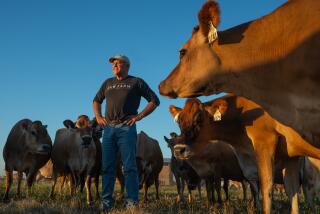Op-Ed: Is soy milk really ‘milk’?
- Share via
About once a week, I pick up a half gallon of soy milk from the market. I do this of my own free will, fully cognizant of what I’m buying. But 32 members of the House of Representatives worry that consumers like me are confused by the word “milk” on the label; they think we’re laboring under the false impression that the carton contains dairy from a cow.
Since the 1930s, “milk” has been legally defined as “the lacteal secretions of a bovine mammal.” It is therefore technically illegal to use the term “milk” on something other than cow’s milk, even with a clear modifier, and now lawmakers are asking the Food and Drug Administration to crack down on products that could steal cows’ thunder. Their stated intention is to protect consumers from deception.
While this latest push to enforce labeling laws has been directed at popular plant-based alternatives such as almond, soy and rice milk, it could also have an effect on other animal products including sheep and goat milk, since they’re not “secretions” from a “bovine mammal” either. No word yet on what these products are supposed to call themselves. “Goat juice” doesn’t exactly caress the ears.
The FDA, to its credit, has not expended much energy playing nanny state on this issue, apparently recognizing that a definition from the 1930s shouldn’t haunt us in 2017, and that there’s no epidemic of confusion at supermarkets. “What’s this almond milk thing? Must be from a cow that ate almonds,” is not a common line of thought.
It is technically illegal to use the term ‘milk’ on something other than cow’s milk, even with a clear modifier.
Dictionaries, moreover, take a wide view of what “milk” means; the second definition in Merriam-Webster is “a liquid resembling milk in appearance” — which should certainly cover plant-based alternatives. And the rare person who truly isn’t clear on what she’s buying could always refer to a nutrition label. (In the 1930s, nutrition labels weren’t yet mandatory, but of course they are today.)
There’s something else going on here. Whatever lawmakers may say, they’re trying to protect the dairy industry, not consumers. Dairy is struggling. The latest data from the USDA show that Americans are drinking nearly 40% less dairy milk than they were a few decades ago. (In 1970, the average American was drinking about 12 ounces of milk per day. Now it’s closer to 7 ounces.) This fall, the USDA stepped in to buy $20 million worth of cheese to reduce a glut caused by lack of demand. The dairy industry’s response to this socialist price support? “Not enough!”
In the meantime, the dairy-alternatives industry is thriving, expanding sales by 250% over the past five years. Plant-based options such as almond, soy and rice milk make up 9% of the milk market, and new ingredients and brands are rapidly being developed to meet demand.
Consumers are not buying plant-based milk because they have been tricked into believing they actually came from a cow. Some are interested in exploring new flavors or finding healthy alternatives to cow’s milk; others have concerns about the environmental impact of conventional milk production or object to the treatment of dairy cows.
It’s not the first time Big Food has stepped in to squelch competition. In late 2014, Unilever filed a civil suit against the San Francisco startup Hampton Creek, claiming that the company shouldn’t be allowed to call its plant-based mayonnaise “Just Mayo” since it doesn’t contain eggs, which are required for mayonnaise under the same Depression-era regulations. In the end, Unilever dropped its suit and Hampton Creek was able to keep its “Just Mayo” brand, in part because there is no standard for “mayo.”
The milk push may come to nothing as well. The FDA has not yet replied to the eager lawmakers, and Washington is in a fairly anti-regulatory mood at the moment. But the fact that such an absurd rule remains on the books creates market uncertainty for producers of dairy alternatives. That’s why my organization, the Good Food Institute, filed a Freedom of Information lawsuit earlier this year seeking all relevant enforcement records as a first step toward filing a petition calling for permanent regulatory change.
Current 1st Amendment jurisprudence makes clear that if the government is going to restrict corporate speech, it must be in furtherance of a legitimate government purpose, and helping one industry over another does not qualify. Restricting the “milk” label would, then, not only be condescending to consumers, but also potentially unconstitutional.
“Soy milk” and “almond milk” are accurate labels. If we want to call things what they are, we can start by calling this latest legislative effort by its true name: industry-funded market interference.
Emily Byrd is the San Francisco-based communications manager of the Good Food Institute, a nonprofit that promotes alternatives to animal agriculture.
Follow the Opinion section on Twitter @latimesopinion or Facebook
MORE FROM OPINION
The smart home has ears, and it can’t keep a secret
Got ‘milk’? Dairy farmers rage against imitators but consumers know what they want
Did a Trump tweet save the Office of Congressional Ethics? Not really
In our increasingly technological world, why do humans so love the supernatural?
More to Read
A cure for the common opinion
Get thought-provoking perspectives with our weekly newsletter.
You may occasionally receive promotional content from the Los Angeles Times.






